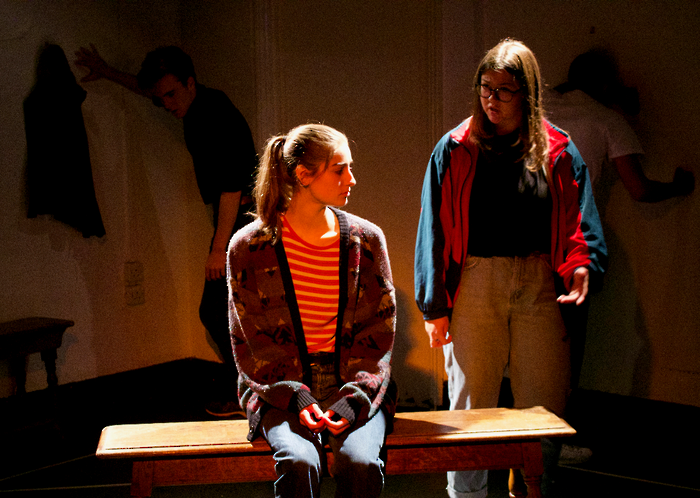Debris is an aptly performed, diverting family study
Carla Plieth finds the design and staging of Debris compliment the strong performances of the actors in this compelling two-hander.

The one-act play Debris tells the story of siblings Michael (James Rodgers) and Michelle (Orli Vogt-Vincent) as they try to negotiate their dysfunctional relationships with their family, themselves, and each other. When Michael finds a baby in a dumpster and brings the newly named ‘Debris’ home, the siblings need to stick together to keep Debris a secret from their father, and their previously constructed web of lies begins to fringe.
The two-hander directed by Ella Burns begins as a series of monologues and later culminating in dialogic interactions between the two actors whose powerful performances make up for the of occasional troubles of Dennis Kelly’s script. Now and again, the siblings get their own spotlight back and it is in this that Rodgers and Vogt-Vincent truly shine. The siblings want to believe they are not at all alike, but truth tells differently. From similar dirt-stained socks to their obsession with the same-sex parent, Michael and Michelle have much more in common than they both want to acknowledge. Their baggy, stained clothing is fitting and, as more appealing than it maybe should, a good choice from costume designer Caroline Katzive that adds depths to the play. However, the choice of a blue shirt for Michael and a pink top for Michelle seemingly (or ironically) reinforces stereotypical roles that are reversed within the play. After all, it is Michael who decides to take home and raise a baby as his son: “This is my boy. This is my Debris.” He longs for a family - a happy, intact family - offering comfort and protection like he has only ever seen on TV, emphasising the distressing view he and Michelle seem to have of the world.
“If we weren’t in the Corpus Playroom, you might expect a stale smell, more leftovers, and dust bunnies.”
The minimal set is decorated with a shabby red couch; toys are lying around, even a crisps bag and crumbs. The white sheet thrown over the couch is filthy. Overall, it creates an uncomfortable atmosphere. If we weren’t in the Corpus Playroom, you might expect a stale smell, more leftovers, and dust bunnies. Michael and Michelle’s home is anything but friendly and welcoming, and it explains if not justifies the reasons for them making up ever more absurd stories. Rodgers and Vogt-Vincent make use of the whole stage, fittingly expropriating the couch as need arises, for example by Michael to restage their father’s apparent crucifiction. Thus, they create an allegory of the living-room, as the epitome of home, being not directly destroyed but disturbed, upended.
Generally, the largely monologic structure of the play emphasises the siblings’ loneliness. With seemingly no-one to turn to but each other, they narrate their stories in an attempt to fill the void surrounding them and excuse their parents’ absentness. In particular, Rodgers’ Michael seems to be afraid of silence. He can’t be quiet and stagnant for long, a hasty-taken breath indicating that he’d rather ramble on than endure the silence. Although both actors give a splendid performance, it is Rodgers who truly shines. He steers Michael skilfully through the debris of his life, delivering a performance that can be on the edge of tears in one moment and close to madness in the next. Having Michael lick his lips constantly is a clever move and adds to the perception of the adolescent boy as somewhat creepy but also deeply vulnerable and traumatised by his childhood. While Vogt-Vincent started out less remarkably, her performance, alongside her character, constantly evolved and culminated in some great exchanges and soliloquies towards the end.
Considering the overall cheerlessness of the story, Debris is surprisingly funny in parts, and got a good amount of laughs from the audience, especially when the two actors quickly and ably change tone from dramatic to sarcastic. Dennis Kelly’s script includes morbid elements, deliberate inconsistencies, and an alternating narration by the two siblings in an apparent fight over who can create the most shocking stories out of their disturbing childhood and their dysfunctional family. Entertaining, especially for a two-hander, the staging of Debris benefits from its actors’ knowingly navigating the minimalistic set and the chemistry between their rivalling sibling characters. Debris is a diverting family study, brought to life in a fitting setting.
 News / Cambridge student numbers fall amid nationwide decline14 April 2025
News / Cambridge student numbers fall amid nationwide decline14 April 2025 Lifestyle / First year, take two: returning after intermission14 April 2025
Lifestyle / First year, take two: returning after intermission14 April 2025 News / First candidate to announce chancellorship bid pledges to tackle bullying 12 April 2025
News / First candidate to announce chancellorship bid pledges to tackle bullying 12 April 2025 News / Rowing row continues as Oxford and Cambridge scrap women’s trial race9 April 2025
News / Rowing row continues as Oxford and Cambridge scrap women’s trial race9 April 2025 News / PETA urges Cambridge dictionary to change ‘derogatory’ rat definition11 April 2025
News / PETA urges Cambridge dictionary to change ‘derogatory’ rat definition11 April 2025





